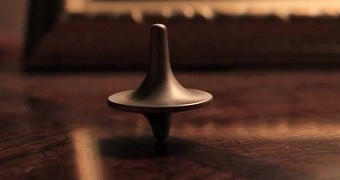Christopher Nolan’s “Inception” came out in 2010 and was the biggest release of that year, a win with both the fans and the critics (but not the Academy, which again refused to show him proper love). Five years and countless fan-theories later, we still don’t know what happens after the film ends, the significance of the open ending.
If you saw the movie and want a reminder, check out the video below. If you haven’t yet, stop reading right now, because *this article contains spoilers.
Don’t expect answers from Nolan, though: in an interview with filmmaker Bennett Miller at the Tribeca Film Festival 2015, he refused to explain the ending, but offered a very solid reason for so doing, Vulture reports.
Chris Nolan and the frustrating and beautiful ending of “Inception”
“Inception” ends with Cobb getting back to the States and being reunited with his two children, in the home he had left when he was falsely accused of the murder of his wife. As the camera moves away from the group of three chit-chatting and hugging it out, it focuses on a large wooden table, on which a top is spinning.
Earlier in the movie, Cobb explained that this was his totem, helping him to determine whether he was still in a dream or awake: if the top never stopped spinning, he was in a dream. If it wobbled and fell, he was in real life.
The viewer never gets to find out what happens this time with the totem, because Nolan chose to cut just as you got the impression that it was about to fall.
In older interviews, Nolan said that talking about the totem was missing the point of the scene, which was all about Cobb’s family reunion. In other words, it didn’t matter if he was dreaming or not, as long as he was back with his children.
Later on, he changed his tune, saying that he liked to believe Cobb was back in reality, because he too (Nolan) had kids and didn’t like the idea of having a father away from them.
No more explaining
At Tribeca, Nolan flat-out refused to engage in any way in conversation on the ending of the film. From what he told Miller (“Moneyball,” “Foxcatcher”), he had very good reason to do so, having already burned himself once.
“I’m not going to answer that, or I would have in the film,” Nolan said. He added that he made the mistake of offering his interpretation of another famous open ending (“Memento”) on the red carpet at the film’s premiere. His brother Jonathan was furious.
“I said, ‘It’s up for the audience to decide, but this is what it means to me.’ Then I gave a greatly detailed answer on what the ambiguities of the film meant to me,” Nolan said. Jonathan’s reply was: “You don’t understand. Nobody hears that first bit where you say it’s up to the viewer to decide if you then give your interpretation.”
That was the first and last time Christopher Nolan offered his interpretation for his own movies.

 14 DAY TRIAL //
14 DAY TRIAL // 